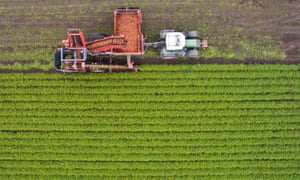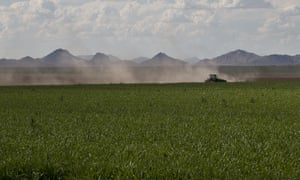https://www.theguardian.com/global-development/2019/feb/21/worlds-food-supply-under-severe-threat-from-loss-of-biodiversity?CMP=fb_gu&fbclid=IwAR3g3NdKZNk3aQf4drc0dZD4Uyj0bzATXBI4vAZ2rOGFrXNI_ZbqQAyT7GY
World's food supply under 'severe threat' from loss of biodiversity
Plants, insects and organisms crucial to food production in steep decline, says UN
The world’s capacity to produce food is being undermined by humanity’s failure to protect biodiversity, according to the first UN study of the plants, animals and micro-organisms that help to put meals on our plates.
The stark warning was issued by the Food and Agriculture Organisation after scientists found evidence the natural support systems that underpin the human diet are deteriorating around the world as farms, cities and factories gobble up land and pump out chemicals.
Over the last two decades, approximately 20% of the earth’s vegetated surface has become less productive, said the report, launched on Friday.
It noted a “debilitating” loss of soil biodiversity, forests, grasslands, coral reefs, mangroves, seagrass beds and genetic diversity in crop and livestock species. In the oceans, a third of fishing areas are being overharvested.
Many species that are indirectly involved in food production, such as birds that eat crop pests and mangrove trees that help to purify water, are less abundant than in the past, noted the study, which collated global data, academic papers and reports by the governments of 91 countries.
It found 63% of plants, 11% of birds, and 5% of fish and fungi were in decline. Pollinators, which provide essential services to three-quarters of the world’s crops, are under threat. As well as the well-documented decline of bees and other insects, the report noted that 17% of vertebrate pollinators, such as bats and birds, were threatened with extinction.
Once lost, the species that are critical to our food systems cannot be recovered, it said. “This places the future of our food and the environment under severe threat.”
“The foundations of our food systems are being undermined,” wrote Graziano da Silva, the director general of the Food and Agriculture Organisation, in an introduction to the study. “Parts of the global report make sombre reading. It is deeply concerning that in so many production systems in so many countries, biodiversity for food and agriculture and the ecosystem services it provides are reported to be in decline.”
Agriculture was often to blame, he said, due to land-use changes and unsustainable management practices, such as over-exploitation of the soil and a reliance on pesticides, herbicides and other agro-chemicals.
Most countries said the main driver for biodiversity loss was land conversion, as forests were cut down for farm fields, and meadows covered in concrete for cities, factories and roads. Other causes include overexploitation of water supplies, pollution, over-harvesting, the spread of invasive species and climate change.
The trend is towards uniformity. Although the world is producing more food than in the past, it is relying on ever-expanding monocultures.
Two-thirds of crop production comes from just nine species (sugar cane, maize, rice, wheat, potatoes, soybeans, oil-palm fruit, sugar beet and cassava), while many of the remaining 6,000 cultivated plant species are in decline and wild food sources are becoming harder to find.
Although consumers did not yet notice any impact when they went shopping, the authors of the report said that could change.
“The supermarkets are full of food, but it is mostly imports from other countries and there are not many varieties. The reliance on a small number of species means they are more susceptible to disease outbreaks and climate change. It renders food production less resilient,” warned Julie Bélanger, the coordinator of the report.
As examples, the report noted how overdependence on a narrow range of species was a major factor in the famine caused by potato blight in Ireland in the 1840s, cereal crop failures in the US in the 20th century, and losses of taro production in Samoa in the 1990s.
“There is an urgent need to change the way food is produced and ensure that biodiversity is not something that is swept aside but is treated as an irreplaceable resource and a key part of management strategies,” said Bélanger.


沒有留言:
張貼留言